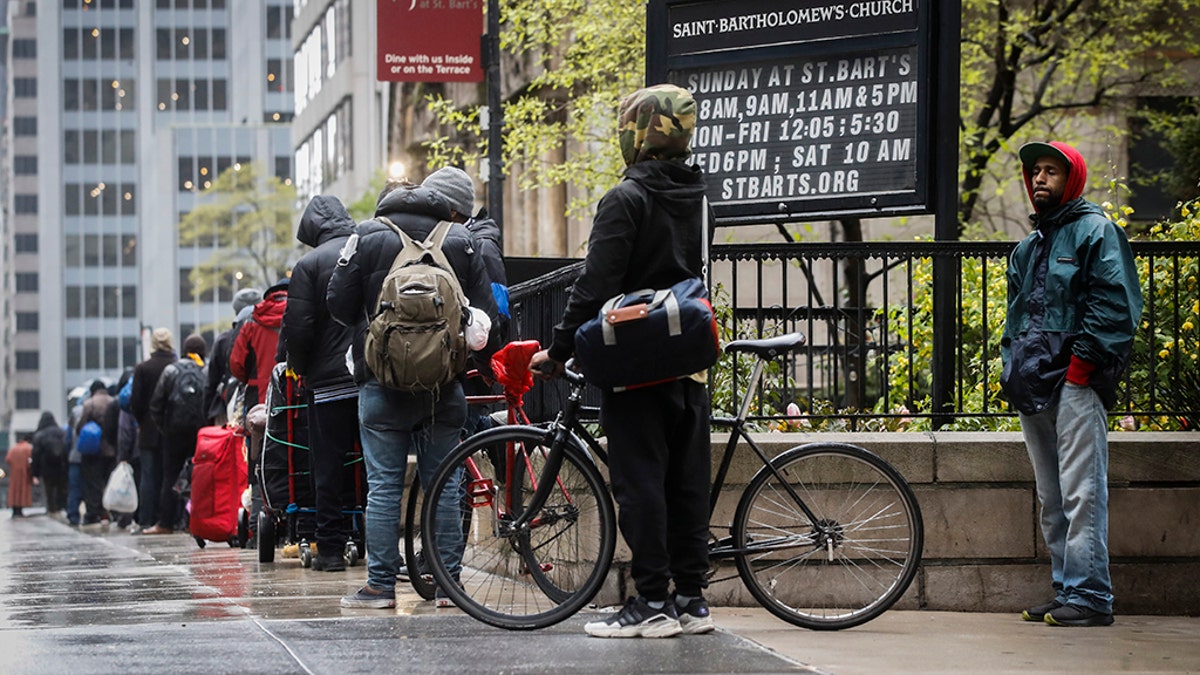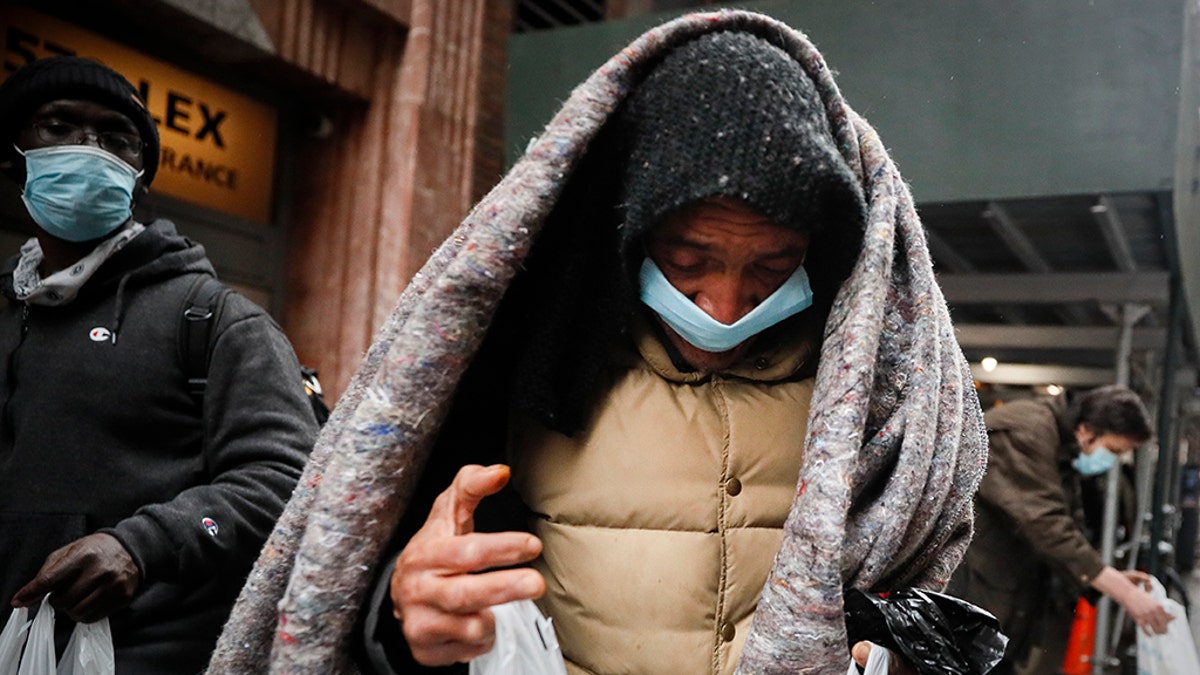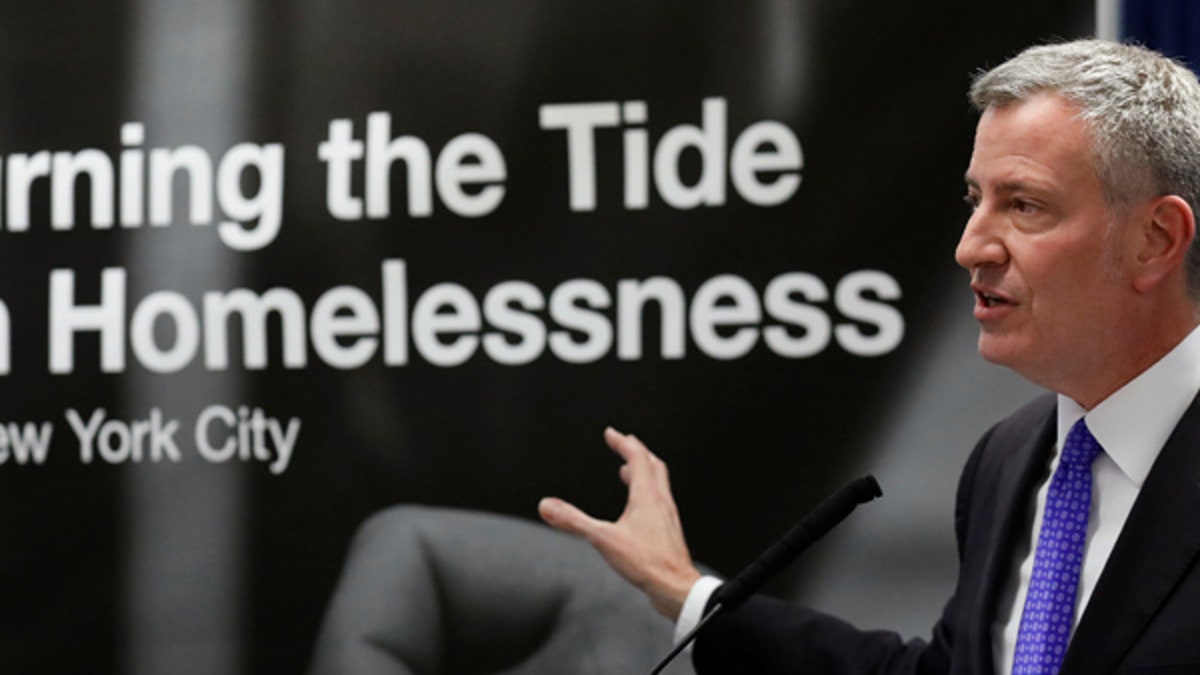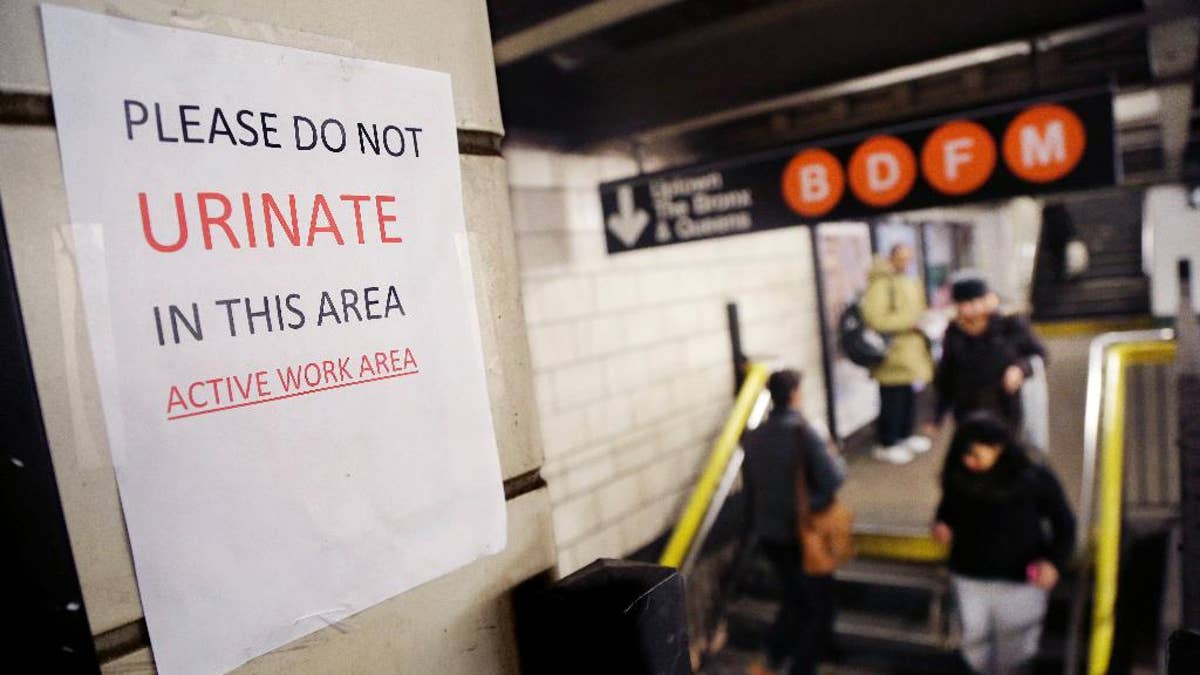Since the novel coronavirus began desecrating through New York more than five months ago, Mayor Bill de Blasio's administration has been filling the city's high-priced hotels with people experiencing homelessness in a bid to ease the burden on the shelter system and to curb the spread of the pathogen – ensuring that individuals have their own room and space to socially distance.
But there is a growing divide between advocates who contend it's the only practical answer – despite the exorbitant costs – and some locals who fear for their own safety and worry it will fiscally break the city and spread crime.
As it stands, at least 139 hotels are deemed home to people experiencing homelessness – a sharp rise from the estimated 40 hotels that were used in place of shelters prior to the outbreak of the global pandemic this year. Around 13,000 individuals are believed to be living in such hotels across some of the five boroughs, with most of them transferred from various shelters. There are approximately 700 hotels in the once-bustling New York City, and roughly 20 percent are now used as homeless shelters.
"(This) will eventually bankrupt the city. With more and more people fleeing the city because of the homeless problem and defunding the police where they don't feel safe, the city will not have the funds to sustain this," Michael Fischer, President of the Central Park Civic Association, an advocacy group endeavoring to alert New Yorkers on the homelessness crisis, told Fox News. "And the crisis is only going to get worse."

In this Friday, April 24, 2020, photo, people wait in line to collect bags of donated food from the Coalition for the Homeless organization at St. Bartholomew's Episcopal Church in New York. It’s always been difficult to be homeless in New York City. But for many, it’s tougher and scarier now because of the coronavirus pandemic. (AP Photo/John Minchillo)
Meanwhile, some residents have voiced their concerns that the program could also catapult a host of other health and safety problems. According to a recent New York Post report, the city moved at least six convicted pedophiles – still on parole – into an opulent hotel on Manhattan's Upper West Side, a mere block from an elementary school playground and thus an apparent violation of state law.
NYC RESIDENTS COMPLAIN OF DRUG USE STEMMING FROM 3 HOTELS HOUSING HOMELESS
The six men are listed on the state's sex offender registry - one of whom "had forced sex with a four-year-old girl." City Hall denied to The Post that the parolees were at that location.
When reached for comment, an official did not confirm nor deny but told Fox News that "the City of New York places all clients in appropriate locations in accordance with State Law – and we provide shelter to New Yorkers experiencing homelessness regardless of background."
"All verifiably homeless New Yorkers have a right to shelter regardless of background. This includes helping people rebuild their lives and grow through second chances as they get back on their feet," said the official, who commented on background. "We don’t discriminate based on people’s previous experiences or backgrounds, and we will not create gated communities within our City."
But it's not only New Yorkers funding the homeless-in-hotels effort – the tab appears to extend to all American taxpayers.
In April – as New York became the epicenter of the virus and there was no indication that hotel business would resume in the near future – a $78 million initial contract was inked to find hotels for people experiencing homelessness. The Federal Emergency Management Agency (FEMA) agreed to foot at least 75% of the costs of the rooms, with the associated expenses – such as moves, the staff, medical care, mental health and extra services – landing on the laps of the New York taxpayers.

In this Friday, April 24, 2020, photo, a visitor looks inside his bag of donated food for people in need from the Coalition for the Homeless organization at St. Bartholomew's Episcopal Church in New York. (AP Photo/John Minchillo)
As it stands, the contract runs through to October. There is no move-out date and it remains unclear if and when the initiative will end.
A small fraction of costs has come from private foundations and donors, such as the "Homeless Can't Stay Home" crowdfunding campaign, which has raised $140,000 since the end of June and estimates that it costs at least $50 per day for a person to self-isolate.
NYC CHURCH BARRICADES FRONT DOOR AFTER HOMELESS TRY BREAKING IN, DEFECATING ON STEPS
However, the costs of renting hotel rooms in one of the world's most expensive cities far exceed that analysis.
Even before the coronavirus incursion, New York was grappling with one of the nation's worst homeless epidemics and was purporting to use hotels to lower numbers. In 2018, the city spent $364 million on contracts for emergency homeless housing – according to publicly available data – with the invoices ranging anywhere between $150 to $400 per night depending on hotel and location, excluding the cost of meals, social services and other medical and substance abuse-related assistance.
In 2018, city investigators approximated that it spent upward of $575,000 a day on rooms to accommodate about 7,500 homeless people. Even then, officials were calling on City Hall to throw more money at the growing problem. Despite de Blasio pledging to end the homeless calamity when he came to office in 2014, it has continued to proliferate – reaching between 60,000 and 80,000 by the end of 2019.
Erin Drinkwater, the city's deputy commissioner of the Department of Social Services, testified on April 23 that before the pandemic, the department paid $17 million per month to rent approximately 3,500 double-occupancy hotel rooms for homeless, single adults.
And as a result of the virus, the bill has only soared as rooms can no longer be shared. Lawmakers in New York are now pushing to pass legislation to spend some $28 million a month on lodging the homeless in hotels.
"Hotels, which are largely vacant due to the drop in tourism and business travel, offer safe, private spaces where homeless New Yorkers can socially distance, which is paramount to the safety of our homeless neighbors and to the health of the city overall," said Giselle Routhier, policy director for Coalition for the Homeless. "The main priority in the midst of a deadly pandemic must be to save lives. Moving people from congregate shelters to hotel rooms is a commonsense and urgently needed intervention to protect homeless people, and should be a model for other cities."
The Department of Social Services (DSS) and the Department of Homeless Services (DHS) have emphasized that they have made “proactive use of commercial hotel locations” to protect some of (the city’s) most vulnerable clients, such as seniors and single adults who we are relocated from larger shelters,” underscoring that the strategies have been successful in saving lives and helping to flatten the pandemic curve.
“As our city responds to and recovers from this unprecedented time, we’re together navigating and making the best of a challenging situation occurring under emergency circumstances. Working in partnership with not-for-profit social service provider partners and communities, we’re confident that we will make this temporary experience the best and safest it can be for these New Yorkers,” spokesperson Isaac McGinn told Fox News. “Now more than ever, these services and supports, this empathy and humanity, are essential."
City Hall declines to specify which hotels are being used citing privacy reasons, but Fox News was able to pinpoint a wide range of extended-stay and high-end luxury hotels being used – with Booking.com showing rooms for rent to visitors at costs no less than $130 per night and some beyond $300 a night.
Many showed no rooms available until at least September – due in large part because their occupancy contracts revolve around their newfound obligations. The NYC Department of Homeless Services (DHS) is reported to have been busing in homeless individuals to hotels at a rate of around 1,000 per week since coronavirus swept in, some local reports have suggested.

New York City Mayor Bill de Blasio discusses the city's homeless population on Feb. 28, 2017. (Reuters)
Yet the notion of unknown sex offenders in the neighborhood is far from the only concern plaguing residents.
A 2018 review by the Department of Investigation also found that "prostitution, drug use, and violence occurred at dozens of hotels that New York City used as shelters for homeless families last year." Out of 57 hotels the city used to house homeless families with children throughout 2017, criminal activity occurred at 34 of them, according to a report released on Thursday by the Department of Investigation.
A number of residents and business owners in midtown Manhattan also said that their biggest concerns were not with the homeless people themselves but with the drug dealers and other nefarious people that were now being drawn to the area to exploit the situation.
Law enforcement has also bemoaned its blunted capacity to control the situation. NYPD Police Commissioner Dermot Shea highlighted on NY1 on Monday morning that he has no role in where the homeless are placed – yet has to deal with the "aftermath" – further stressing that the police department's homeless outreach unit was defunded during this year's budget.
"Your eyes do not deceive you ... if you take a ride up there you see a number of individuals, homeless individuals on the streets, there is no disputing that," Shea told NY1. "We have no role in where homeless are placed but we're certainly dealing with the aftermath now."
Nonetheless, thousands of homeless New Yorkers are indeed some of the most vulnerable in succumbing to the disease. In the first couple of weeks of statewide lockdowns, cases had already been identified in 66 shelter locations, and several months into the pandemic fight more than 100 homeless people had lost their lives.
SAN FRANCISCO POLICE BUST METH LAB AT HOTEL THAT IS PART OF CITY'S ALTERNATIVE HOUSING PROGRAM
The costly endeavor has also failed to stop the sprout of homeless encampments – with a number of homeless people opting to remain on the streets to avoid the restrictions and oversight that comes with government involvement.
In July, de Blasio vowed to do "whatever it takes" to put an end to a group of homeless people wreaking havoc at a bivouac in Manhattan's East Village, but residents have continued to opine that vagrants remain and that toileting on the streets and bus stops, aggressive behavior and panhandling is still a problem.
"Once you place the homeless in hotels, you can't get them out. When you drop thousands of homeless in different communities in the city, you will see an uptick in crime and drug use on the streets," Fischer said. "What the city should be doing is putting the homeless in the Javits Center where there are thousands of beds, have the federal government assist in building portable shelters and the federal government can also assist in reformatting the inside of the current shelters to make them safe."

A sign in the West 4th Street subway station reads "Please Do Not Urinate In This Area - Active Work Area," Tuesday, March 3, 2015, in New York. (AP Photo/Mark Lennihan) (The Associated Press)
From his lens, it is time for politicians to start thinking long term and of less costly ways to help those in need.
"For example, the federal government owns military bases, which they have closed down. The state and federal government own land and land with empty buildings. We need to explore creating modern rehabilitation centers that help the homeless get back on their feet, job training, and affordable housing," Fischer continued.
But the use of commercial hotels as a solution to the homeless calamity is becoming more and more a hot-button issue. Some opponents are pointing fingers at the unsustainable costs, others are blaming the city for not being adequately prepared for a large-scale emergency, and many anticipate that with the end of the moratorium on rent fees even more cash-strapped New Yorkers will be forced onto the streets.
CLICK HERE TO GET THE FOX NEWS APP
Ken Mahoney, the founder of the Wall Street firm Mahoney Asset Management, anticipates that the hotel endeavor will cost anywhere between $250-500 million over the next six months alone. And if FEMA chooses not to extend its contract beyond October, such an expense would simply not be sustainable for city dwellers.
"Once international borders are open, and tourists begin to flow into NYC, probably at the start of next year, then hotels will want to be making as much money as possible to help soften the blow of lost revenue from the pandemic," he added.





